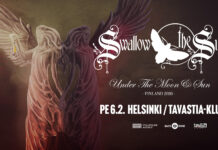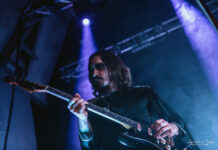For about a decade, Finnish metal act SONATA ARCTICA have veered away from the fast and furious power metal compositions, they once were so known for. After the prelistening event of their new album, “Clear Cold Beyond,” we delved into the intricacies of SONATA ARCTICA‘s latest album, revealing a deliberate shift towards a faster power metal in response to fan feedback. We chatted with keyboard player Henrik Klingenberg and bass player Pasi Kauppinen about the album’s creative process, the production, and much more. Listen to the interview here or check the complete transcript below…
Hi there! Thank you so much for taking the time to do this interview. How are you guys doing today?
Pasi: Good.
Henrik: Good, yeah.
Did you have fun during this prelistening session?
Henrik: Yeah, I mean, we just arrived and dropped our bags at the hotel and came straight here. It was a nice time to rest a little bit while the album was playing.
Was it fun for you to listen to it again, albeit that you have listened to it many times?
Pasi: It’s fun to see that people seem to enjoy to hear it. So that’s that’s the main reason.
Henrik: The album has been done already last summer. We had a listening session in Germany, so we could see some reactions and now here in Finland, this is the second time outside people from our little group have heard this album, so it’s interesting.
In my previous interview with Toni, this was during the acoustic albums, he seemed a little bit tired of the music you have been releasing, which has been a little slower than previously. I was wondering what your sentiment is about the previous records and creating something now that is different again.
Henrik: For example, the acoustic album thing was something we discussed because we did a few tours acoustically. And of course, people started asking when are the album’s coming? The original plan we came up with was that we would go to L.A. to a friend of ours, to his studio, and record it there. So we had the deal already negotiated with the label and everything was set up but we were supposed to do this a bit later. Then, of course, the corona stuff happened and we didn’t really have anything reasonable to do, we couldn’t play shows, and we had to postpone a lot of shows. And so then we decided, okay, we’re going to do it, but we couldn’t go to L.A. for said reasons. So that is why we did it a bit earlier than originally planned. And of course, when you do two albums, with only acoustics, and then we did the tour… With how many shows? 50?
Pasi: Maybe 50.
Henrik: Something like 50 [shows] during 10 weeks. After that, you’re just like, “Ugh,” because this is a heavy metal band. It’s really fun to explore to do different things but when you do it too much at some point, you go, “Okay, can we please go back to doing what we’re supposed to do?” Maybe that’s why he was a bit tired, but I think the acoustic stuff was, I think it was really interesting, even challenging
Pasi: Definitely, yeah.
Henrik: And making those albums was really important at that time and now we’re really happy to go in the totally opposite direction and do something else.
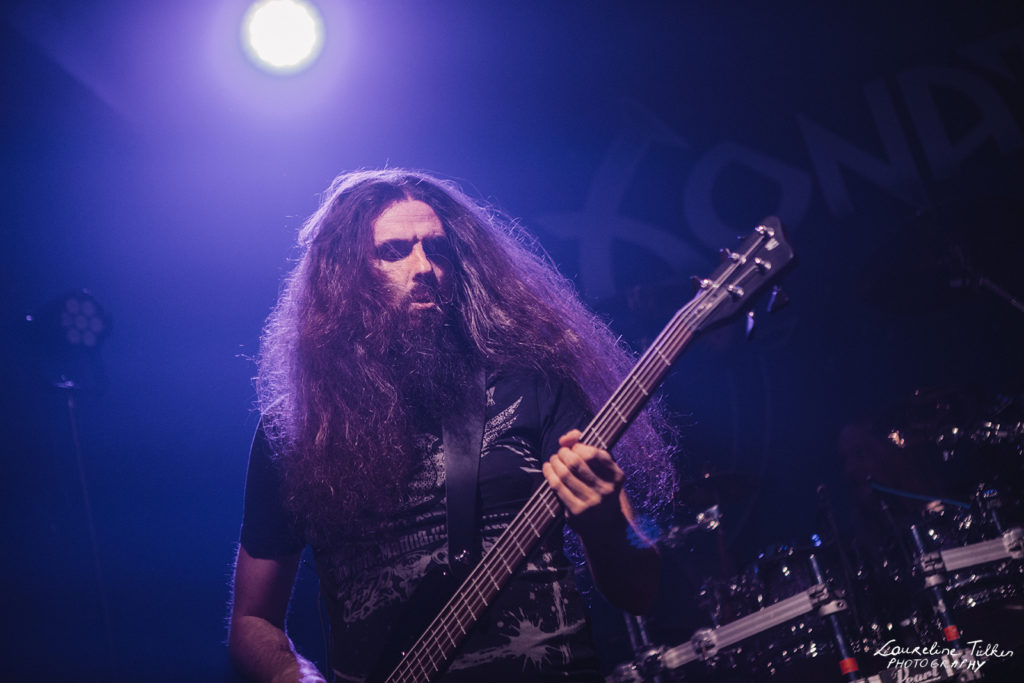
I guess in a way because of the acoustic material, you also had to revisit your material. Did that inspire you more to go back to your roots?
Henrik: That might be. Tony writes all the songs so it’s maybe more about what kind of a mindset he’s in. But of course when when you play a lot of acoustic stuff and get as mellow as you, then at some point there’s going to be a response to that. I think he responded very well.
I think the first singles you released were “First In Line” and “A Monster Only You Can’t See.” How have the fans’ reactions been so far?
Pasi: So far really good, as I know.
Henrik: Especially for “First In Line” people were [positive]. But then, of course, some people were like, “This is probably going to be the only fast song on the album.” Well, it’s not… And now you heard it too.
I can vouch for that, yes.
Henrik: That is also I think a little bit our own fault because we had albums that had one or two fast songs and the rest were something else. I understand the sentiment that you think okay they’re going to do it again.
I thought having “First In Line” as the first song, even felt like some sort of statement that you’re really back doing old power metal! Was that the thought behind it?
Henrik: Yeah, definitely. Because we have been saying that this album is power metal, so we can’t start with a ballad.
I noticed that for the production you went back to Mikko Karmila. Was it intentional to choose him for that kind of old school feel that he brought in?
Henrik: Absolutely.
Pasi: Yeah, as he mixed all the earlier albums, so it was natural to come back.
Henrik: We wanted specifically his sound.
How would you describe his sound?
Henrik: That’s hard, if I say something [wrong], he’s going to be pissed. [laughs] What we wanted to do is basically to make sure the sound is harsh enough and raw and had enough power. We know he is really good at that, so that’s why we chose to work with him again. We’ve been friends for all these years, it felt only natural that since the music sounded like this, we thought that he would be the guy that should mix it.
The music industry has changed a little bit since those albums. Did you also use similar processes to back in the day or did you want to keep it modern when it comes to production?
Pasi: When we started to talk about mixing with him, of course, we wanted to have his mixing sound, but of course, we didn’t want to do anything that is back from 20 years ago. It had to be an album in 2023 at the time.
Henrik: We wanted his view on it but of course dated to this day.
So it was somehow important to you as well that even though you have this old-school sound and feel that it should sound modern as well.
Henrik: Yeah, somewhat. We are not a retro band who are trying to sound like the ’60s or ’70s or something.
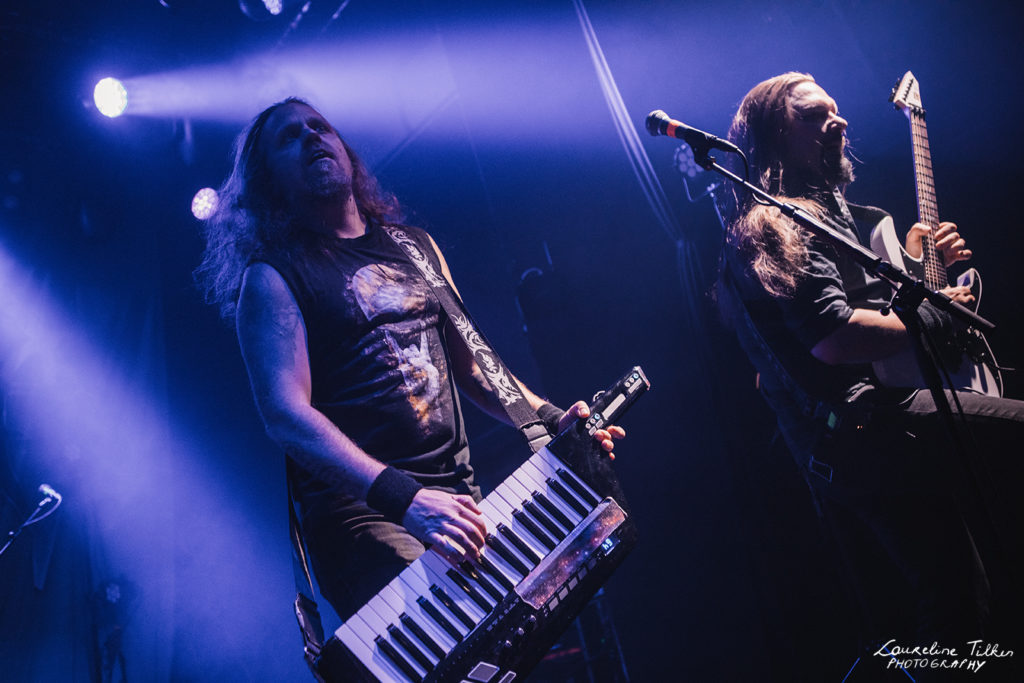
During the listening session, I thought that there were a lot of interesting dynamic moments. The beginning of “Angel Defiled” felt really loud in comparison to the previous track was very interesting. I think you played a lot with contrasts and dynamics on this record. Was that something you spent a lot of thought on?
Henrik: We bounced around the track order quite a bit. Usually, it’s always the problem, but I think at least the beginning of the album was quite clear. Even Tony was like this is how I want it to start and we juggled around a few songs here and there. Dynamics has been a part of our music, even from the beginning. And I think also if you go full force all the time, then at some point, it doesn’t feel feel that powerful anymore. So for example, the beginning of “Angel Defiled,” put something softer before that and it feels more powerful, so it’s intentional.
It almost felt as if you were asking us if we were still awake, so a pretty cool moment. I also noticed that most of the songs are very uplifting but if you listen to the lyrics, they’re often quite deep or sad. I know you guys don’t write the lyrics, but how do you usually feel about the extra contrast?
Henrik: I think it’s good. He always says in interviews that it’s not about his life, so he can be sad and depressed in the lyrics, but he is kind of a jolly kind of fellow… most of the time. [laughs] So I think the contrast is really good because when you go out and play shows you want things to be uplifting and have a good time, right? But there also has to be another level when you listen to it, for example, at home, and you want to read the lyrics and get deeper into it, I think it’s good that there’s that kind of level as well.
I also read that “Dark Empath” is a sequel to “Don’t Say A Word.” Is there anything you can tell fans about this song – it doesn’t have to be lyrically.
Henrik: There are a lot of songs that are connected to that saga. Either the same kind of characters or the same kind of plot with different kinds of characters and everything. There are so many songs involved already and the plot is so confusing. I don’t think Tony even knows himself what’s going on anymore. [laughter] I think it’s quite a massive song. Sonically, there’s a lot of stuff going on that I think is quite interesting. It’s going to be a major part of the album, this song, let’s put it that way.
Are you planning to play live in combination with any of the other parts? Are you ever gonna do a show with only those songs?
Pasi: We already did it.
Henrik: But of course now when it’s more songs…
Pasi: Six years ago.
Henrik: In 2018, we did it during the Winter Tour in Finland, where we played those and we also played “White Pearl, Black Oceans: Part 1 and 2.” Personally, I thought that… I like the progressive stuff, I thought that when we make this kind of show, people are not going to show up, but people seemed to be really surprisingly into it. It was really fund. I think we’re quite lucky to have a lot of diverse material so we can put together different kind of vibes, of course, now we’re going for the punch. It’s going to be quite different, but I think maybe a few albums down the road, when we have some more songs for the saga, then we can play it again.
Pasi: Have a full set. [laughter]
You mentioned that you like playing the progressive material. I think this album has a lot of that as well, not proggy moments, but progressive. Can you talk a little bit about that?
Henrik: It’s basically up to what kind of songs Tony brings to the table. I think if you go back even from the first album, there are some progressive elements there. So it’s always been there. Whether or not people are paying attention to it, depends more on how much we talk about it, so if we say just this is just power metal, then nobody’s gonna notice. If we talk like this is our progressive album, then everybody’s going to be like, “ugh, it’s too prog.” So a lot of those things go unnoticed unless you have to pay attention to it specifically, but yes, it has been there from the start. I don’t think that we ever going to become a band that plays just like straight songs where everything is clear and there aren’t many layers, and no weird stuff. There’s always going to be some quirky things in there.
Now considering that you’ve been playing slower songs for the past few years. Was it difficult going back to fast-paced power metal sections?
Pasi: Not at all, after those acoustic years… [laughter] It was quite easy.
Henrik: I think actually, I had to play faster on the acoustic stuff. [laughter] Because when we played “Wolf & Raven” live on an acoustic piano, it was quite a lot harder than playing it on a synthesizer because of the keys.
You also probably don’t know why Tony specifically wrote a song about California, but I was wondering whether you have any memories connected to California in general that you could share?
Henrik: Yeah, when was the last time we went there?
Pasi: We did the road trip…
Henrik: Oh, yeah!
Pasi: From L.A. to San Francisco, it was really great.
Henrik: It’s funny you ask us that because it was just the two of us. We played a show in Seattle, we stayed there overnight, and instead of staying on the bus, we flew down to L.A. to meet our friend whose studio we were supposed to use for the acoustic album, and then he drove us up to San Francisco, so we could drive the Coastal Highway and see a lot of stuff.
Pasi: I think that’s our greatest memory from California.
Henrik: We had a lot of fun on that trip, yeah.
That doesn’t seem like something that is always possible on tour with logistics and so on. Are you planning to do that more in the future?
Pasi: Usually we try to do something on every tour, at least in the States when there are those longer rides and distances.
Henrik: Sometimes there is like two days of driving ahead and then maybe you want to fly somewhere else or whatever.
Pasi: Or then you just stop somewhere where there is something to see. We went to Elvis‘ house.
Henrik: To Graceland!
Pasi: And Niagara Falls. Stuff like this.
Henrik: There is not too much time for sightseeing, but when you go to places a lot of times, you see a little bit during the first time, something else the next time, and so on. Over the years, you’ve seen quite a lot at the end.
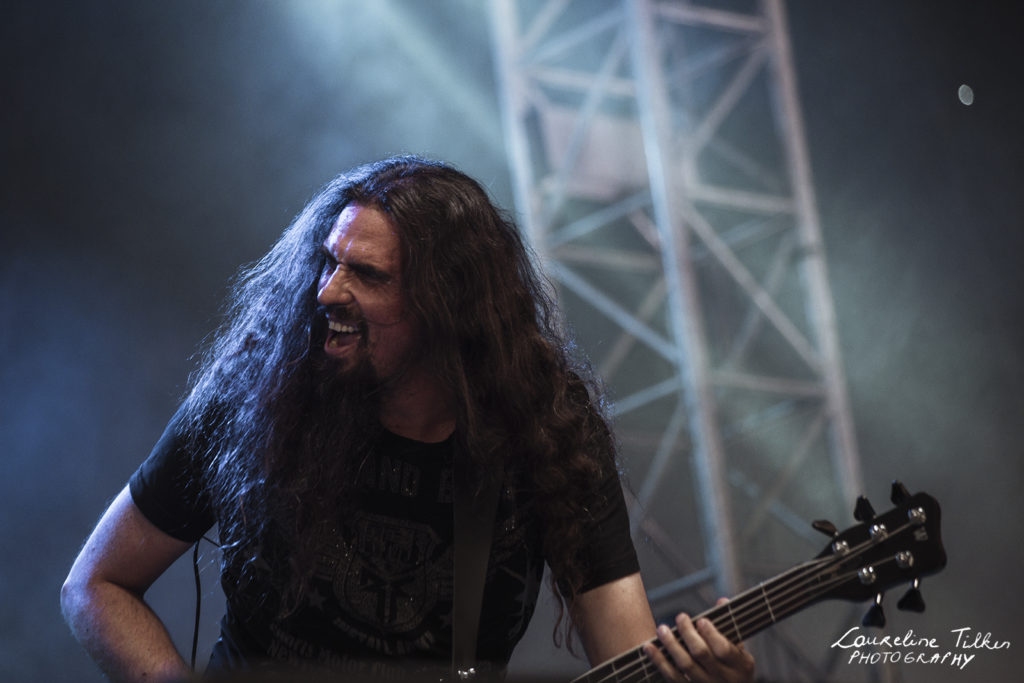
Going back to the album, I really liked the opening section of “Shah Mat” and I thought it was cool because it felt like you were combining the old and new SONATA ARCTICA. Is there anything you can say about that song?
Henrik: I’m trying to remember which one that is. [laughter]
I guess the third one?
Pasi: Actually, when we were listening here now, Elias was saying that, “Yeah, this reminds me a little bit of ‘Life’ from ‘Ninth Hour.'” So maybe that’s true, but Elias just said it to me and Tony so. He noticed that too. [laughs]
Henrik: I never thought about it that way.
Pasi: Me neither. [laughter]
Well, it’s good that you are getting some new insights today! “Clear Cold Beyond” was a great way to end the new album, towards the end it also became a little bit more hopeful, why did you settle for that song as the title track?
Pasi: That was Tony‘s idea, I think that was not mentioned from the basics.
Henrik: I think we’ve never had a situation where we have a song and the album title being the same, right?
Pasi: No. No we don’t have any.
Now that you mention that…
Henrik: Just wanted to make sure. [laughter]
Pasi: I think he didn’t want to do that now either but somehow it turned out [this way].
Henrik: Nobody came up with a better idea. That’s usually how it turns out when we start with something and then anybody can suggest anything, but it has to be the best idea that wins.
Pasi: Yeah, but I think that the title is really good.
Henrik: Yeah, it is the best idea, and that’s how it should be. I also like the song. Most of the songs during the whole album – the song before that I think is also a little bit easier – but otherwise there are not really any ballads on the new album. I think it makes sense to calm down and also that song is really beautiful. I think Tony wrote it really beautifully and it’s good to put it at the end, so it doesn’t get in the way of all this.
Yeah, it would be a little weird to have a fast song end the record. Are there any moments on this album that you are particularly proud of?
Pasi: I think there are many of those, but usually after the recording process and mixing process and mastering process, you are full of the album, now it’s been ready for like 6 months or something…
Henrik: Since August, maybe.
Pasi: So, it was only a couple of days ago I finally got the opportunity to listen to it as an outsider and just enjoy the music, just listening to what we did last summer. [laughter]
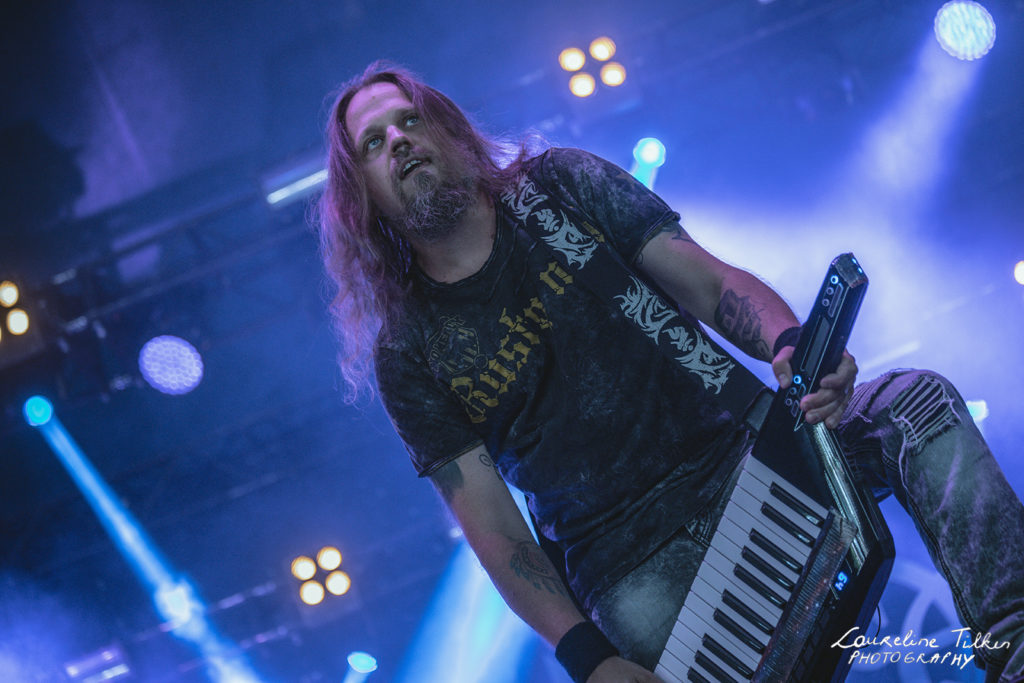
I can’t remember really if you guys already have show dates planned, most likely, but what are your next steps after the release of this album?
Henrik: We’re gonna start touring, as usual, and hope that we can continue touring like usual. We’re doing a Finnish tour first in March, and then we start with the festivals, we already have one booked in April and one in May, and then the whole festival touring starts so to speak. We’re playing throughout the Summer, then we’re doing Europe in the Fall. After that, there are some plans, but they’re not public yet, it’s basically touring until at least the Summer of 2026 and the festivals. We haven’t talked about anything beyond that yet, but I would imagine that if everything goes well, we’ll go back to the next album, and continue touring, everything is as it should be, hopefully.
I noticed with the previous tours, you also included a lot more older songs. I think the first time I saw this was at Tuska, maybe two years ago. I can’t remember when you were last there.
Henrik: Last year?
Pasi: No, the year before.
Henrik: Oh yeah, we got that one. Somebody canceled and we got it really short notice.
Pasi: 2022 it was. Maybe? [laughter]
How has it been to include these older songs that maybe you hadn’t been playing for a while in the setlist and change things up a little?
Henrik: It’s fun. This is album number eleven or twelve?
Pasi: Eleven.
Henrik: We have released almost 150 songs, so there’s plenty to choose from. Of course, personally, I think it’s most interesting to play stuff that you haven’t played, but usually, there’s a reason why you haven’t played it. [laughs] But yeah, I think it’s fun to bring back some of the older songs and it’s also been in line with what we’re doing now. So we, of course, want to bring songs into the set that work well with the new songs as well. And now we also already played “First In Line” live last Fall with STRATOVARIUS when we were touring. I think that was, for us, let’s get together with the STRATOVARIUS guys and play power metal again and just make sure that everybody understands we are going this way now.
I guess when you first play a new single live, it’s also a bit of a test to see how the audience reacts. In terms of that, how was it to if you paid attention to it?
Pasi: I think it was released the day before we started.
Henrik: It was surprisingly good, usually when you play new songs, people don’t know them well. So it doesn’t really matter if it’s good or bad, some people are going like “Oh, what’s going on?” If you play “Full Moon,” everybody knows it, so I think it’s a bit dangerous to start comparing because then you’re never gonna play anything new. I think people seem to like it and get into it surprisingly fast. I hope we’re on the right way.
Pasi: I also remember it. It was in Umeå.
Henrik: At the festival.
Pasi: Yeah, I can remember the exact moment when we started to play the song.
Henrik: The panic and the horror. [laughter]
Does it take a lot of practice to get these songs to the stage together?
Henrik: Not so much actually. That is only because we practice, you practice a lot at home first, so you’re actually really sure about the song. For us, we’ve been playing together for… Actually, Tony said yesterday that this is the longest that SONATA has been together with the same lineup, so we are used to playing together and it’s not really that difficult to bring new material. As long as everybody has done their homework, which these days we do.
You mentioned this has been the longest-standing lineup of SONATA ARCTICA. What is the secret to your team if there is any?
Henrik: I don’t know. Try to not piss your bandmates off too much?! [laughter]
That does seem important.
Henrik: I think it’s very important that we all have the same level of commitment to what we’re doing. And then also to have to accept that we are all really different and like different things and that’s fine. And of course, we’re not kids anymore. We learned to live and get along and take a little bit easier every once in a while.
Well, that’s it for my questions. Do you have any last thoughts you want to share with your fans?
Henrik: Check it out. It’s gonna be great.
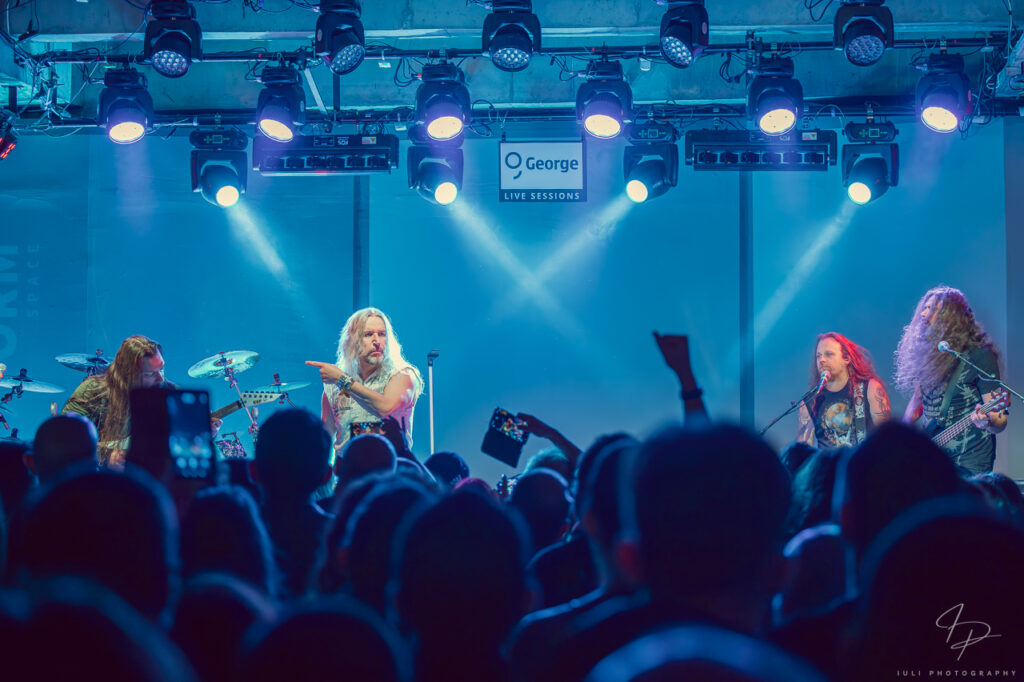
Interview by Laureline Tilkin



